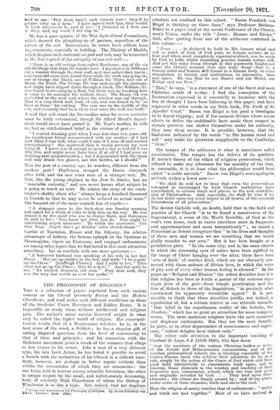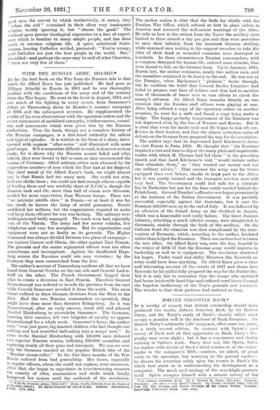THE PHILOSOPHY OF RELIGION.*
Tars is a collection of papers reprinted from such various sources as the Church Quarterly Review and the Modern Churchman, and read under such different conditions as those of the Students' Union Movement and Liddon House. It is impossible to study them without intellectual and religious gain. The author's name carries deserved weight in what may be called the higher world of religion. His cosmopoli- tanism recalls that of a Renaissance scholar ; he is, in the best sense of the word, a Gelehrte ; ho has a singular gift of raising disputed questions from the level of controversy to that of ideas and principle ; and his connexion with the Modernist movement gives a touch of the romance that clings to lost causes to his career. Like a man of a very different type, the late Lord Acton, he has found it possible to avoid a breach with the authorities of his Church in a difficult time. Both, however, are perhaps in better repute without than within the communion of which they are ornaments : the one being held in honour among scientific historians, the other in unique respect by the small, and unfortunately decreasing, body of scholarly High Churchmen of whom the Bishop of Winchester is so fine a type. Not, indeed, that his Anglican • Essays and Addresses on the Philosophy of Religion. By Baron Friedrich von 1W(31. London : Dent. Me.)
admirers aro confined to this school. " Baron Friedrich von Hugel is thinking on these lines," says Professor Bethune. Baker in a paper read at the recent Conference of the Church. men's Union, under the title " Jesus : Human and Divine."
And, after quoting from one of the addresses contained in this volume :—
" Jesus . . , is declared to hold in His human mind and will as much of God, of God pure, as human nature, at its best and when most completely supernaturalized, can be made by God to hold, whilst remaining genuine human nature still. And yet this same Jesus (though in this supremely heightened sense the Christ) remains thus also truly Jesus—that is, a human mind and human wall bound to a human body, to sense stimulation, to history and institutions, to succession, time and space. He can thus be our Master and our Model, our Refuge and our Rest."
" This," he says, " is a statement of one of the finest and most Christian minds of to-day. I find the conception of the Incarnation expressed in it essentially in harmony with the line of thought I have been following in this paper, and have expressed in other words in my little book, The Faith of the Apostles' Creed." Baron von Hiigel is too good a theologian to be found tripping ; and if the eminent divines whose recent
efforts to define the undefinable have made them suspect in certain quarters can shelter themselves under his authority, they may sleep secure. It is possible, however, that the limitation indicated by the words " in His human mind and will " may make the quotation inapplicable to the Cambridge " Stirs."
The temper of the addresses is what is sometimes called constructive. This temper has the defects of its qualities.
If Acton's theory of the ethics of religious persecution, which refused to make any allowance for the morality of the time, is untenable, it is at .least what the philosopher would have called " a noble untruth." Baron von semi-apologetic attitude strikes a lower note :- " We shall do well not to deny that oven the persecutions tolerated or encouraged by later Church authorities have contributed, in certain times and places, to the real consolida- tion of Christendom. And, especially, we shall be wise if we do not insist upon any sense innate in all hearts, of the essential heinousness of all persecution."
The devout Catholic will, no doubt, hold that in the faith and practice of his Church " is to be found a massiveness of the Supernatural, a sense of the World Invisible, of God as the
soul's true home, such as exists elsewhere more in fragments and approximations and more intermittently " ; so sound a Protestant as Jewett recognizes that " in the lives and thoughts of these men and women we see something that we would gladly transfer to our own." But it has been bought at a prohibitive price. " In the same city, and in the same church in which the streaming eyes of saints have been uplifted to the image of Christ hanging over the altar, there have been ' acts of faith ' of another kind, which are not obscurely con- nected with those. ardours of Divine love, in which the voice of pity and of every other human feeling is silenced." In the paper on " Religion and Illusion" the writer describes how it is that religion has been so fertile a parent of the seelerosa aique impia facta of the poet—from temple prostitution and the fires of Moloch to thoso of the Inquisition, " in precisely what
constituted its apparently irresistible appeal." It is per- missible to think that these atrocities justify, not indeed, a repudiation of, but a certain reserve in our attitude towards, " that belief in the superhuman reality of the Infinite, the Absolute," which has so great an attraction for some tempera- ments. The more moderate religions leave the mob unmoved and displease enthusiasts. But they are the most durable.
In piety, as in other departments of consciousness and experi- ence, " violent delights have violent ends." The writer calls attention to the important teaching of Cardinal de Lugo, S.J. (1583-1660), who lays down
" that the members of the various Christian bodies or sects, of the Jewish and Mohammedan communities, and of the heathen philosophical schools (he is thinking especially of the Graeco-Roman ones) who achieve their salvation, do so, as a rule, simply by the action of the Grace of God which aids their good faith instinctively to concentrate itself upon, and to practise, those elements in the worship and teaching of their respective sect, communion, school, which are true and good and originally revealed by God. . . . They feed upon these elements ; the others are simply passed by ; and divine grace, under cover of these elements, feeds and saves the soul."
Here the religion of sanity touches that of enthusiasm ; " mercy and truth are met together." Most of us have noticed ID good men the extent to which instinetively, it seems, they
refuse the evil " contained in their often very inadequate religion, tacitly ignoring it, but " choose the goad." The Cardinal gave precise theological expression to a fact of experi- ence which. is familiar to many simple people, and has done much to sweeten religious life. A quite unlettered Scots- woman, hearing Catholics reviled, protested: "You're wrong ; good Catholics are just the best people in the world. But," the added—and perhaps the same may be said of other Churches, " there are very, few of them."











































 Previous page
Previous page